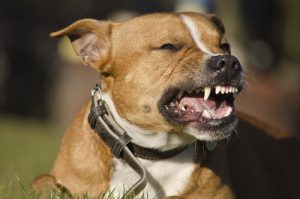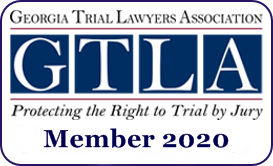
More than 4.5 million dog bites occur each year in the United States, according to the Centers for Disease Control and Prevention. Of these attacks, nearly 20 percent require medical care.
Dog bites and attacks are traumatizing for their victims – many of them young children. Dog bites can cause serious physical and emotional harm. Serious attacks can plague victims for the rest of their lives. Thankfully, Georgia law provides these victims with options to pursue justice.
If a dog attack in Georgia injured you or a loved one, then Cain Injury Law is here to help. We stand up for justice and compensation for your injuries. Our experienced personal injury attorneys are committed to aggressively fighting for your rights. We also provide you with the compassionate and personalized attention you deserve.
Our positive testimonials and case results demonstrate we have what it takes to tackle even the toughest cases.
At Cain Injury Law, we support you through each step of your dog bite claim. We can help you understand your legal options. We can gather evidence that helps prove your claim. We can negotiate with insurance companies on your behalf. We are with you every step of the way.
Don’t wait to get on the road to recovery after a dog bite. Contact the experts at Cain Injury Law today to schedule your free consultation. Call us or reach us online to get help now.
Georgia’s Responsible Dog Owner Act
Under Georgia’s Responsible Dog Owner Act, dog owners can be held responsible when dogs under their control seriously injure a person or another animal. Serious injuries are defined as more than just a scratch or nip. They include physical injuries that:
- Require multiple sutures, hospital admission, or plastic surgery.
- Result in death or create a significant risk of death.
- Cause broken or dislocated bones.
- Seriously impair someone’s health, such as through infection or contagious disease.
Georgia’s dog bite law was passed in 2012. Under the law, the term “owner” includes anyone who owns, harbors or has custody of the dog that attacked someone. That means if you are watching a dog for a friend and it attacks someone, then you can be held liable for damages.
Veterinarians, dog groomers, and boarders can also be held responsible if a dog under their care bites someone. Parents can be liable if their child’s dog attacks someone, and in certain circumstances, landlords might be liable.
A dog is classified as vicious when it seriously injures a person or causes that person to be seriously injured as he or she tries to escape. The law imposes several requirements on the owners of vicious dogs. The owner must:
- Register the dog and get a “vicious dog” certificate.
- Get the dog microchipped.
- Never sell, donate, or transfer the dog unless it is to an authorized facility for euthanasia.
- Maintain a sturdy and secure enclosure on the owner’s property to contain the dog.
- Post “vicious dog” warning signs at every entrance to the property.
- Avoid taking the dog off the property, unless the animal is in a locked crate or is muzzled and on a leash less than six feet long.
- Never leave the dog unattended with a minor.
- Notify officials within 24 hours if the dog is on the loose, attacks a human, dies, or is euthanized.
- Maintain a liability insurance policy for the vicious dog with at least $50,000 of coverage for bodily injury or property damage.
Owners who fail to comply with these rules can face an aggravated misdemeanor charge. The dog may also be confiscated. If a person is convicted of violating this law – and then the dog causes another serious injury – that person can face a felony punishable by up to 10 years in prison and a fine up to $10,000. That person must also pay to have the vicious dog euthanized.
The law includes two important exceptions. Dogs are not classified as “vicious” or “dangerous” if:
- The dog attacks someone while they’re being used to carry out official law enforcement or military officer duties.
- The dog attacks someone who is abusing them, trespassing or committing or attempting to commit a crime.
Georgia Dangerous Dog Law
The Responsible Dog Owner Act replaced Georgia’s Dangerous Dog Act. Under the new law, a “dangerous dog” is defined as a dog that:
- Goes beyond growling, barking, or baring their teeth, and does something aggressive enough that someone could reasonably believe the dog poses an imminent threat.
- Bites and significantly punctures a person’s skin but does not cause “serious injury.”
- Kills another pet animal while away from the owner’s property, unless the dog is a herding dog, hunting dog or predator control dog.
The Responsible Dog Owner Act imposes several requirements on owners of dangerous dogs. Owners must:
- Register the dog and obtain a dangerous dog certificate within 30 days of moving to Georgia or within 10 days of moving within Georgia to a new jurisdiction.
- Keep the dog in a secure, locked enclosure on the owner’s property.
- Post “dangerous dogs” signs at every entrance to the owner’s property.
- Avoid taking the dog off the property, unless the dog is in a locked crate or on a leash less than six feet long.
- Notify the local dog control officer within 24 hours if the dog dies, attacks a human, or is on the loose.
An owner who violates these rules can face misdemeanor charges and must give up the dog to a dog control or law enforcement officer. The owner can retrieve the dog after showing proof of compliance with the responsible dog owner rules. The owner must also pay fees to cover the confiscation and the government’s cost of housing the confiscated dog.
If the owner doesn’t retrieve the dog within 20 days, then the government can euthanize the dog. The owner still must pay for the costs of the dog’s housing in addition to euthanasia expenses.
Leash Laws in Georgia
Georgia does not have a statewide leash law. However, many counties and cities within the state have their own rules on leashing. For example, in Gwinnett County, dog owners and custodians must keep dogs under restraint or control at all times. This means that the dog must be controlled in one of several ways:
- Inside a building or secure fence.
- Restrained by an “invisible fence.”
- On a leash controlled by a competent person.
- If off-leash, within immediate proximity of a competent person and obedient to the person’s voice commands.
Under Gwinnett County laws, it’s illegal to tether a dog outside unless the owner or custodian is also outside at the same time in a place where they can see the dog.
Gwinnett County Dog Bite Rules
Beyond the rules imposed by Georgia’s Responsible Dog Owner Act, Gwinnett County rules also require owners to get their dog vaccinated against rabies by a licensed veterinarian. Owners must also maintain a current rabies vaccination certificate for the dog. A dog that bites someone must be confined at an approved facility for 10 days at the dog owner’s expense.
Gwinnett County also mandates that owners of dangerous dogs must maintain liability insurance of at least $100,000 to cover any bodily or property damage caused by the dog. Owners of vicious dogs must maintain this liability insurance with at least $1 million in coverage.
Owners in Gwinnett County must notify officials within 24 hours if they sell, donate or transfer a dangerous dog. Officials must also be notified any time that the dangerous or vicious dog leaves the county.
Dog Bite Victims’ Rights
Georgia is a “one bite rule” state. What is the one-bite rule for dogs? The law gives a dog bite victim the right to file a claim against the dog’s owner or custodian if the victim did nothing to provoke the attack, such as taunting or abusing the dog.
The victim must prove either that:
- The owner knew or should have known the dog was aggressive.
- The owner didn’t properly restrain the dog or take reasonable precautions, such as a leash, to prevent the attack.
Victims can sue for dog attacks that don’t involve biting. For instance, they may sue if they get knocked over or are injured while trying to escape an attack, provided their case meets the above conditions.
Dog Owners’ Responsibilities to Keep Others Safe
Georgia has very strict rules that owners of dogs classified as vicious or dangerous must follow. However, all dog owners have a responsibility to keep others safe. Even if a dog has never attacked anyone, Georgia dog owners and custodians must take reasonable steps to prevent attacks on humans and other animals.
For example, owners must ensure their dogs are properly restrained at home and on walks. Owners must also refrain from training dogs to act aggressively. If a dog exhibits symptoms of aggression, owners must avoid certain activities such as letting their dog roam off-leash or leaving them alone with a child.
Owners that ignore these signs can face serious consequences if their dog attacks someone. The consequences including having the dog euthanized.
Dog Bite Laws FAQs
At Cain Injury Law, we can answer all of your questions related to dog attacks. We can also handle every detail of your dog bite claim. We often receive these questions about Georgia dog bite laws:
Dog Bites
Can I sue if a dog bites me?
Under Georgia dog bite laws, victims of dog bites can sue if a dog causes them serious injury. They’ll need to provide substantial evidence to prove the cause and severity of their injuries. That evidence may include witness testimony and medical reports.
Victims must also demonstrate that they were on the property legally when the dog attacked, and that they did nothing to provoke the attack. Victims must also show that the dog’s owner either should have known the dog was aggressive or was careless in trying to prevent the attack.
Dog bite cases are also subject to Georgia’s statute of limitations rules. Victims generally have only two years from the date of the dog attack to sue for compensation.
Can you sue someone if their dog attacks your dog?
Yes, Georgia’s Responsible Dog Owner Act allows people to sue the owners of dogs that seriously injure or kill other dogs. This is essentially a dog-bites-dog lawsuit.
The same rules apply as with attacks on humans. The person who wants to sue must prove that they and their dog did nothing to provoke the attack. The victim must also prove that the attacking dog was either vicious or dangerous or that the dog’s owner was careless in some way.
What happens if your dog bites someone in Georgia?
If your dog bites someone and causes a serious injury, dog control or law enforcement can confiscate the dog. The animal control board may also set up a hearing. The owner will have to fight to keep the dog from receiving a classification as dangerous or vicious.
Who should you report a dog bite to?
Call 911 after a dog bite in Gwinnett County. The operator will dispatch medical responders as needed. The operator will also contact Animal Welfare and Enforcement on your behalf.
Who should you report a dog bite to? Call 911 after a dog bite in Gwinnett County. The operator will dispatch medical responders as needed. The operator will also contact Animal Welfare and Enforcement on your behalf.
Attacked by a Dog? Talk to a Georgia Dog Bite Lawyer Now
If you or a loved one were the victims of a dog bite or dog attack, you need an experienced dog bite lawyer on your side. At Cain Injury Law, we have the skills and resources to help you get the maximum compensation you’re owed. We’ve helped personal injury victims recover millions of dollars for their injuries. We handle dog bite lawsuits. We can help you reach a Georgia dog bite settlement.
Don’t wait a moment longer to fight for the justice and compensation you deserve. Get started today by contacting Cain Injury Law online. You can also call us to schedule your free consultation.










 Site by Consultwebs.com: Personal Injury Law Firm Website Designers/Lawyer Marketing.
Site by Consultwebs.com: Personal Injury Law Firm Website Designers/Lawyer Marketing.